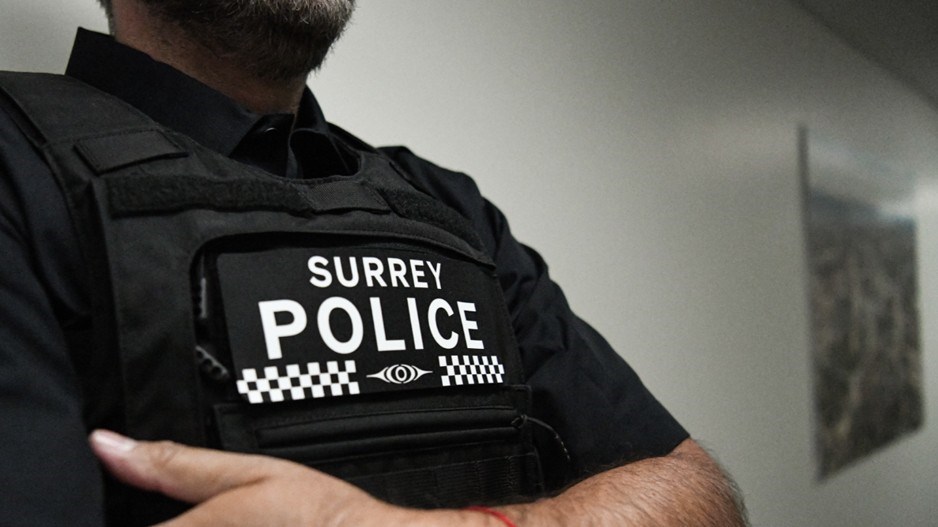Surrey residents are facing an extraordinary property tax hike of 17.5 per cent to address cost overruns for city hall’s police transition project as well as overall increased operating costs attributed to inflation.
The proposal would mean the average residential property, presently valued at $970,502, will see its property tax bill increased by about $380 this year. Residents with higher property values will pay more and those in lesser valued homes will pay less, on a sliding scale.
The City of Surrey is specifically proposing, in a report issued Feb.17, a 9.5 per cent tax hike to cover a shortfall for the police transition, plus a seven per cent increase to cover increased operating costs, including adding new police officers and firefighters and, finally, a one per cent increase for its roads and traffic levy.
Residents also face a three per cent increase to user fees for community services.
The police transition is currently in flux, awaiting final approval from the provincial government. Presently, the city is transitioning from Surrey RCMP to the Surrey Police Service (SPS), a process that began in November 2018 at behest of former mayor Doug McCallum.
However, McCallum’s former council partner turned critic Mayor Brenda Locke, who defeated McCallum in last October’s election, has proposed halting the transition.
At issue is cost overruns now made clear by city hall following the election. The key driver is overlapping of RCMP and SPS officers while in transition.
This year, if the transition continues, policing will cost $262.2 million and if it is halted policing will cost $257.2 million.
The biggest cost associated to halting the transition is an estimated $82 million in severance to SPS officers.
The tax increase is based on a halt to the transition and hence a $116.6-million shortfall. The 9.5 per cent increase will cover $38.9 million this year with the rest to be borrowed internally and then re-paid by 2025.
The city has updated its annual RCMP costs to include an additional 25 officers per year for the next five years, bringing the total from 734 members to 860. As such, the contract for 2024 jumps from $158.9 million to $186.2 million, for example.
Since 2018, the McCallum administration had halted hiring new police officers. The city has grown by an estimated 50,000 residents (over 1,000 residents per month, according to the city).
Included in the tax hike is a $9.3-million increase for fire services, by adding 20 new firefighters and increasing salaries.
The proposed budget also adds a third sheet of ice to the planned Cloverdale Sport and Ice Complex.
The Cloverdale arena is one of several projects that were delayed under McCallum’s administration, as it kept to a 2.9 per cent base tax increase (while also increasing borrowing and increasing the residential parcel tax by $200 per home in 2020).
The city’s report speaks to “extraordinary inflationary pressures,” as increased interest rates and construction costs result in “significant cost increases to large in-progress capital projects.”
Whereas Surrey once enjoyed relatively low taxes in the region, the report states this large increase "would place Surrey in the middle for property taxes collected for the respective average assessed home in Metro Vancouver."
Locke said she and her Surrey Connect council members chose to maintain existing services and keep capital projects on track, as opposed to cutting them to pay for the transition cost overruns.
“The money wasted by the policing transition, combined with the so-called 2.9 per cent property tax rate for four years implemented by the previous council, means we are now having to play catch up on core city services, such as the hiring of firefighters and bylaw officers. Surrey can ill afford to continue with the police transition and we are starting to set our finances straight with this budget," Locke stated in a news release Feb.18.
Coun. Linda Annis of Surrey First released a statement Feb. 21 also largely blaming the McCallum administration.
“Mr. McCallum’s famous and fictitious, 2.9 per cent annual tax increases, his complete lack of a plan to build much-needed infrastructure, his constant deferral of maintenance, a lack of transparency around policing, and the potential cost of shutting down the police transition, have put our city and its taxpayers in a precarious financial position,” said Annis.
“At the same time, we’re still dealing with a lot of financial assumptions about the cost of keeping the Surrey Police Service, or continuing with the RCMP, and that lack of solid information has bothered me right from the start,” added Annis, who renewed calls for an independent audit of the transition.
Coun. Mike Bose called the situation a “financial mess.”
Meanwhile, McCallum’s former council colleagues with Safe Surrey Coalition councillors Doug Elford and Mandeep Nagra stated the city ought to keep the SPS transition on track and continue with a 2.9 per cent tax increase.

